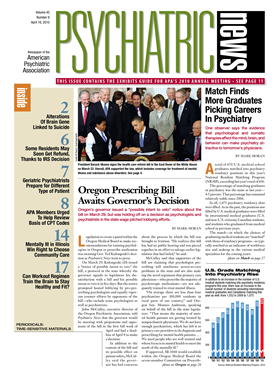Psychiatrists are trained to treat patients with altered mental states and diminished capacity to make decisions, but addressing the legal and ethical complexities surrounding such patients may not be as clear as responding to their medical problems.
A workshop at the 2010 APA annual meeting next month will help attendees better understand the psychiatrist's role in guardianship and powers of attorney for patients with impaired decision-making ability and will offer practical advice.
Issues related to guardianship and powers of attorney deeply involve patients, families, and medical professionals, often putting them in emotional and contentious positions. “Psychiatrists are often called on to provide advice on the mental competency of a dementia patient,” David Casey, M.D., chair of this workshop, told Psychiatric News. Sometimes psychiatrists are asked by the court to determine whether a patient meets the criteria for needing guardianship.
Although powers of attorney allow patients to make medical decisions for themselves in advance and designate a decision maker for medical care, conflicts among family members may still occur, causing disputes over crucial treatment decisions.
Guardianship generally requires the court's judgment of an individual's mental incapacity, and this process often involves psychiatric evaluation.
Understanding the legal and ethical considerations that affect seriously impaired patients is important for psychiatrists while they try to provide the best care. Guardianship and powers-of-attorney issues can affect crucial decisions including involuntary admission to psychiatric care and consent to treatment, especially electroconvulsive therapy.
“This is a big issue, especially in geriatric psychiatry,” Robert Roca, M.D., workshop co-chair, commented to Psychiatric News.
“We often deal with patients with compromised decision-making capacity.... Sometimes we need another person to make decisions about treatment,” said Roca. “There are legal instruments we need to content with.”
Although the workshop is titled “Guardianship and Powers of Attorney: Issues in Geriatric Psychiatry,” it is relevant to psychiatrists beyond geriatric practice, according to Roca and Casey. Dealing with patients who have dementia may be the area that most often poses guardianship challenges for psychiatrists, but the issues are similar in other areas involving impaired or incapacitated patients, such as acute psychosis or traumatic head injury, they said.
Psychiatrists in general practice or other specialties will also find the workshop informative and useful. “These issues are not covered very well in medical schools and residencies,” said Casey. “This session will be educational and cover general but up-to-date information.” Patient cases will be presented and analyzed during the session to illustrate the issues and describe strategies.
Casey is a professor and vice chair of psychiatry at the University of Louisville School of Medicine. Roca is vice president of medical affairs at Sheppard Pratt Health System in Towson, Md. The workshop will include presentations from Helen Kyoman, M.D., a geriatric psychiatrist and clinical instructor in psychiatry at McLean Hospital, and Winsor Schmidt, J.D., LL.M., the Endowed Chair/Distinguished Scholar in Urban Health Policy, a professor of psychiatry, and a professor of family and geriatric medicine at the University of Louisville School of Medicine. As an expert in medical law, Schmidt will present legal principles and discussions from an attorney's perspective.
The workshop will take place from 11 a.m. to 12:30 pm on Monday, May 24.

